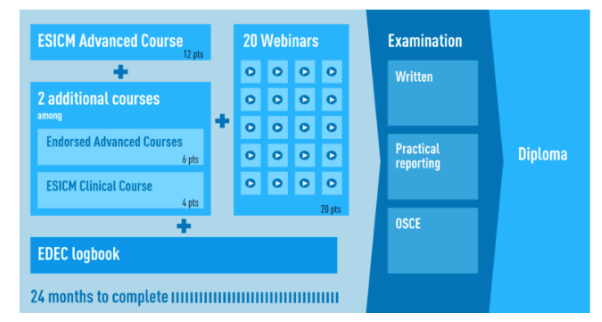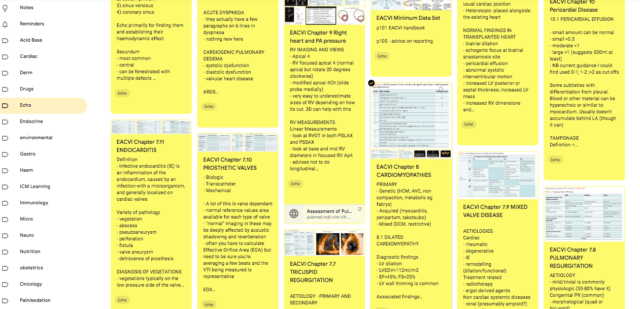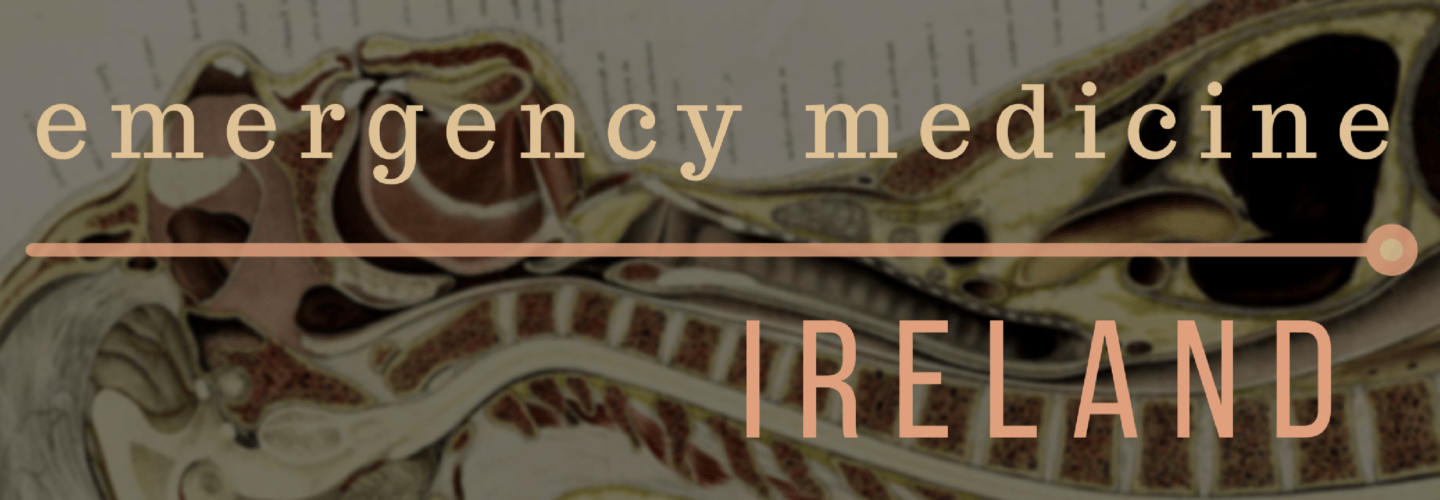There are no shortage of options for those who wish to attain some form of accreditation in echocardiography from a critical care perspective. JFICMI have a page dedicated to your options for recognised echo training where much more useful official advice can be obtained.
These can be broadly split into two categories
1) Basic or Level 1 Echo
This will generally involve mainly simply 2D imaging of the heart from the usual windows. Any doppler will be limited and the process of accreditation usually involves attendance at a course and some form or proctored log book with cases in the low double digits. This will get you 90% of what you need clinically to manage a sick patient and in my very humble opinion should be mandatory for everyone looking after proper sick people.
2) Advanced or Level 2 Echo
I spent some time investigating this last year before embarking on my accreditation process and my summary is below from July 2019 when I started this process. It is not meant to be in any way conclusive and is clearly based on my personal opinions. Of note I chose EACVI in the end and got final sign off in October 2021.
Both BSE ACCE and EACVI are considered equivalent level 2 qualifications, though I suspect BSE ACCE is harder to achieve (and therefore probably the better one!) . Overall the level of supervision, support and time afforded to acheive the qualificaton is probably more important than the qualification itself.
BSE (British Society of Echocardiography)
- 2019 BSE ACCE Accreditation
- 5 full cases with all the clips and reports submitted (these have to be complete, 3 can be outside of ICU and 1 normal)
- Log book of 250 of a varied case mix (submitted via BSE portal)
- 2 years to get it all done
- Written exam can be done any time which is a mix of theory and reporting.
- Includes a practical exam which is done once the 250 scans completed
- 70 sterling membership + 250 sterling for accreditation
- Big advantage here is that it is an ICM focussed qualification.
- Main disadvantage is that anecdotally it is probably more onerous than the EACVI qualification
EACVI (European Association of Cardiovascular Imaging – part of the ESC)
- Guidance
- Written exam (August/December at one of the European Congresses)
- 2 parts, one theory and one reporting.
- Logbook submission
- This is a very straightforward written log of what you did, images and reports need stored somewhere but not submitted as part of the log book.
- 12 months only to collect 250 scans
- Needs signed by a supervisor
- 6 video case submissions around 15 images each (non-ICM specific)
- 5 year recertification process
- No in person practical exam
- €560 (I think – though €360 if you join the ESC at €80) for full process
- Main downside is not ICM focused (in terms of case mix) and only 12 months for cases (but note this got extended another 12 months due to COVID. Yay COVID)
- Syllabus
- Full guidance
- Seems to be for consultants only as per the ESICM website but I think this is available to those without specialist registration at supervisor discretion.
- A number of ESICM courses to attend
- Need TOE too
- It does not seem that this has been recognised as a level 2 qualification by the major cardiology organisations (eg BSE or EACVI). It certainly seems an appropriate advanced level qualification for ICM and but if you need the formal level 2 piece of paper then bear that in mind.

All of them are a major commitment.
The exam
Don’t underestimate the work needed for the exam. I put a good 4 months work into the EACVI exam. There is a lot of physics and calculations and grading that is of little relevance to everyday critical care practice but it does give you a solid background in understanding echo and more importantly the limitations of the numbers generated on the echo reports. I did OK on theory and barely scraped through on the reporting. I suspect this reflects someone who has read a lot about echo but has nowhere near the image exposure of someone like a cardiology trainee.
Textbooks
- EACVI Handbook: in many ways this is an awful book for learning from. It is NOT a book to read and be educated by. I used it as the numbers and methods would be specific to the exam and it would cover the key points from the curriculum. And I used it as the framework for the notes and Anki cards that I produced (see below).
- Otto’s Textbook of Echocardiography: This is fairly comprehensive and I found it a good read especially for some of the conceptually difficult doppler stuff. I had the 6th edition. If i wanted educated I read this. Feinbaum’s is the other big book in a similar vibe but have never read it.
- I have since got the Oxford Textbook of Advanced Critical Care Echocardiography which is wonderfully specific for critical care and the physics and theory more than lives up the “advanced” label. It would not have given me the foundation knowledge I would have needed for the EACVI exam but it is well written and immediately applicable to critical care. I must admit I found many of the images to be of very poor quality and while it looks like you get online access to the textbook with your purchase it’s really only to the supplementary echo clips which I found terribly frustrating.
Resources:
- EACVI have a pay for access online video course that is directed to the EACVI exam. It covers all the major topics and is well produced but is a little stiff in the presentation and doesn’t do a great job of teasing out the complicated choke points in understanding. I paid the money and did find it worthwhile overall.
- the Nepean ICU in Australia publish a weekly video tutorial that is ran as part of their DDU teaching but wonderfully published for all of us to see too. It is possibly the most underated critical care echo resource out there and sometimes I wonder if it’s just me and Segun watching it. Sam Orde does a wonderful job of explaining the complex concepts in way that is useful for something like the EACVI exam but from a clinical perspective helps to put all the findings in the ICU context.
- British Junior Cardiologists Association have some nice videos.
- 123 Sonography have some very useful free videos but they’re very much designed to get you to but their advanced materials which are no doubt great but I wasn’t ready to commit that much cash. Some of the free to view ones are below
Anki
I love Anki. Chris Nickson put me on to this and while I toyed with it for the FRCEM I really committed to it for the EACVI exam and the JFICMI exam. There are pre existing decks. Mine is here. I used an American one too. Anki is great for rote learning of large volumes of abstract information which is perfect for the sheer volume of numbers and cut offs needed for the exam.
Google Keep
I have fairly committed to keep at this stage. I like the colours and the tagging and the speed and searchability of simple text notes. I’ve never been a big fan of evernote.

Hopefully I’ll post the notes on here for what they’re worth (which is not a great deal…) over the next while. I still refer to them when I’m scanning on a regular basis and the google keep notes formed the basis of the anki flashcards.
The Log Book
I knew it would be substantial but in order to get the numbers you need you will have to commit a lot of non clinical, unpaid time into staying late or going in early to keep your log book ticking forwards. I managed a substantial number of scans while on call in the ICU but this came at the price of the 2 hrs sleep I might have otherwise got overnight. Do not commit to this if you are planning a busy year otherwise. As those who have worked with me know I was somewhat obsessed with getting numbers in the log book. It took over my life to a degree. If COVID had not come along I would have really struggled to get the 250 in 12 months required for EACVI. Be warned
Reports
One unit I worked in had the full echo PACS set up where you could report images and do your measurements on the computer rather than the machine. This made life so much easier compared with doing a report on the ultrasound system itself. Ultimately you want a PDF with all your numbers and your report narrative stored somewhere
Image management
Ben Smith is an emergency physician in the states but much more importantly is a lovely guy who creates incredibly useful software including DICOM to MP4 which will covert all those horrible DICOM exports into lovely little MP4 files. He also has a great deidentifer if your machine doesn’t let you deidentify at source.
Twitter is really a gold mine here for all the clips of the odd and random things that might come up in the reporting exam. There is so much complex valvular and oddities that you will never see in clinical practive if you work in critical care (as opposed to cardiology) but the #echofirst hashtag will get you started and then you can follow specific accounts from there.
